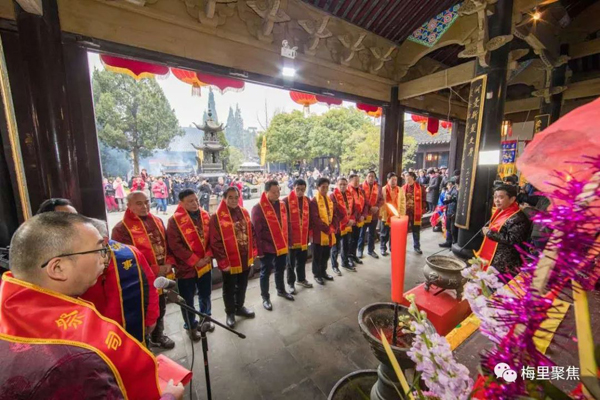Over 300 relatives of the Wu clan gathered in Taibo Temple in Meicun sub-district, Wuxi's Xinwu district to worship their ancestors on Feb 12, or Jan 8 of the Chinese lunar calendar.
The sacrifice event began on Jan 6 of the Chinese lunar calendar and lasted for three days. To restore the most traditional form of worship, Wu Taibo, masters of Wuxi Xuan Juan, a Wuxi-style of storytelling, and Taoism music were invited.
Zhang Minwei, inheritor of Wuxi Xuan Juan, sang the praises of Wu Taibo accompanied by Taoist music and dances.
 |
|
Over 300 relatives of the Wu clan gather in Taibo Temple in Meicun sub-district, Wuxi's Xinwu district to worship their ancestors on Feb 12. [Photo/WeChat account: meicunrizhi] |
A total of 5,000 residents took part in the event to pray for good luck in the new year and looked forward to the various activities of the annual Temple Fair on Feb 13. The temple fair is one of the most significant events in the city and in all of Jiangsu province. Wuxi city in East China's Jiangsu province is well-known as the birthplace of Wu culture, which is considered to be the foundation of the ancient culture of the Jiangnan region.
The Taibo Temple is located near the entrance of the ancient town. It is now Wuxi's largest and best-preserved architectural complex of the Ming and Qing dynasties.
Every Jan 9 of the Chinese lunar calendar, Wuxi holds a Taibo temple fair to commemorate Wu Taibo, the founder of Wu culture, who is praised for his nobility and humility in giving away his crown to his younger brother.
In July 2007, the Taibo Temple Fair was approved as one of Wuxi's first Intangible Cultural Heritages. It was listed as a Jiangsu Intangible Cultural Heritage in July 2009, and was named a National Intangible Heritage for the fourth time in December 2014. The fair will run for eight days, and feature various troupes performing the lion dance, waist drum, stilt walking, and other local folk attractions.